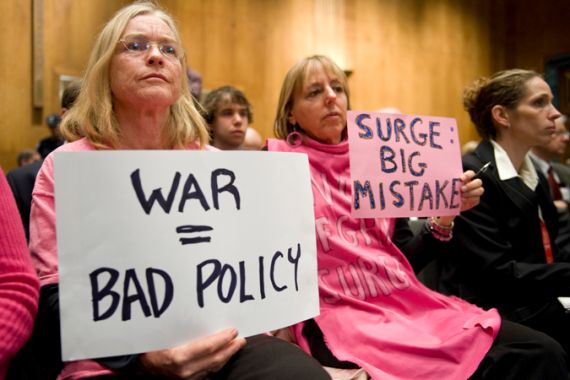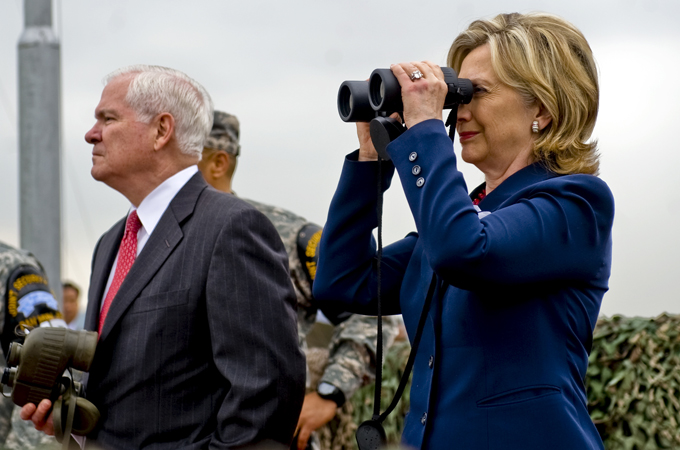Public opposition can end US wars
Despite American officials continuing to disregard public opposition to the wars, the public can still have an impact.

 |
|
Secretaries Gates and Clinton discount American opposition to the ongoing wars in Afghanistan and Iraq [Getty] |
After President Obama’s Thursday speech praising the illusory progress in Afghanistan, the floor was turned over to Hillary Clinton, the secretary of state, and Robert Gates, the secretary of defence. When asked about the growing unpopularity of the “long war,” they both replied that the administration’s intention is to ignore all popular opposition.
In fact, both secretaries expressed open contempt for the notion that the public’s war fatigue could possibly have any impact on ending the conflict. But both secretaries were wrong. Despite an official policy of disdain and even mockery toward the public’s will, the American people can end this war.
If the attitude in the White House sounds familiar, it’s because it is. President Bush et al responded to similar complaints about the Iraq War with a determination to see it continue long after they were out of office. The public, it seems, wises up about the reality of wars long before officials care to.
With death tolls rising precipitously and official claims of imminent victory ringing ridiculously hollow after years of repetition, it isn’t hard to understand why public opposition to the Afghan War has swelled to 60%.
Yet so far that opposition is a mile wide and an inch deep. Public resistance to the war may be generally accepted amongst voters, but it is far from a top issue for many, who are convinced the rising budget deficit and crumbling domestic economy must take priority. A reasonable position on first blush, but at some point the public must inevitably realize that these issues are not distinct.
The economy is struggling because of overspending, and it is the rising cost of the unnecessary and unpopular wars that is the driving force. In short it is precisely the administration’s ambivalence toward the public’s desire to see these wars end that is at the root of America’s domestic woes.
For years, that has been the secret to keeping an opposed public largely quiet about the wars that the US military has been engaged in. By sustaining war, the administration guarantees domestic economic problems. So long as those problems are viewed as unrelated to foreign policy, both can continue to go unaddressed, for years.
But the American public cannot be kept in the dark about these policies forever and must inevitably be roused from its disinterest to challenge the administration’s claims that their opinions just don’t matter in the grand scheme of things. Indeed as officials continue to cozy up to the idea of a decades-long war, nothing short of popular demand can be influential.
Several NATO member states have already been driven out of Afghanistan by popular opposition. Britain and Germany are openly discussing withdrawal in the near future primarily because, despite their governments’ official support for the conflict, they cannot maintain this sort of occupation indefinitely when the public is demanding an end.
Are the American people not at least as influential toward their government’s policies as the German people or the Dutch? If their collective will can end the war, why can’t ours?
Secretaries Gates and Clinton may have been attempting to break the spirit of the war’s opponents by dismissing them out of hand, but I would urge you instead to view it as a personal challenge. They don’t believe you can end this war. Let’s prove them wrong.
Jason C. Ditz is news editor at Antiwar.com, a non-profit organization dedication to the cause of non-interventionism.
The views expressed in this article are the author’s own and do not necessarily reflect Al Jazeera’s editorial policy.